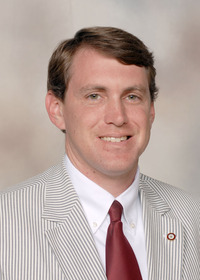Information Possibly Outdated
The information presented on this page was originally released on November 16, 1998. It may not be outdated, but please search our site for more current information. If you plan to quote or reference this information in a publication, please check with the Extension specialist or author before proceeding.
Extension Center Aids Local Governments
MISSISSIPPI STATE -- When the votes have been counted and a new local official takes office, work has just begun for the 25-year-old Center for Governmental Technology.
The center is a unit within the Enterprise and Community Resource Development program area of Mississippi State University's Extension Service. It was established in 1973 to help local officials understand the duties they are to perform.
Every four years, Mississippi voters place about 3,000 local officials in office in the state's 82 counties and almost 300 municipalities. Another 2,000 are appointed to other official positions. In recent elections, about half the people who won have never held public office.
The CGT helps officials carry out their duties by offering educational, training and certification programs, providing technical assistance and distributing specialized publications.
P.C. (Mac) McLaurin Jr., Extension's local government specialist, heads up the CGT.
"We exist to provide the highest quality educational programs and training possible for local government officials," McLaurin said. "Training for local officials has been considered one of the missions of the Extension Service."
The CGT's calendar is full of educational programs offered throughout the state to a wide variety of clients. The Center does not charge for its extensive list of services.
CGT offers two accreditation programs, one for municipal clerks and tax collectors and another for county assessors and appraisers. To date, 1,063 city clerks, assessors, tax collectors and deputies have participated in the municipal program, coming from 242 Mississippi municipalities. Of these, 351 have received certification and 125 more are working towards it.
Currently, 405 county officials have been certified under the assessors and appraisers program. Salary supplements for 280 of these qualified officials averaged $2,645 each for a total of $740,500 statewide.
"The certification programs result in more economical local government because resources are used efficiently when counties and municipalities do things right the first time," McLaurin said.
In addition to the certification programs, technical assistance and specialized publications, the Center offers orientation and continuing education classes for municipal and county officials.
Marie Lee's 1997 election as a Starkville alderman introduced her to city government.
"I was just a citizen off the street my first year, and the introductory courses the Center offered taught me how to be a worthwhile alderman," Lee said. "I think as long as I'm an elected official, I'll continue to go to these meetings. There's always some new aspect to your job that they provide a resource to, or maybe answer a question, that helps you do your job better."
Providing educational programs and training is an ongoing effort within the Center.
"We keep current on contemporary issues facing local government, as well as changes in state law that affect the organization and operation of city and county government," McLaurin said. "To this base of knowledge, we add input from the officials themselves and state government agencies on what type of subject matter should be included in educational programs."
Larry Johnson is serving his first term as a Leflore County supervisor. With no previous experience as an elected official, he attended orientation provided by the CGT.
"The training was extremely useful for me and I'm sure a lot of other first-term supervisors," Johnson said. "They taught me what to expect of the first term, talked about handling the media and legal do's and don'ts."
Other CGT meetings allowed Johnson to meet with representatives of the Attorney General's office, audit department, ethics commission and others to ask questions. He was also given phone numbers of people to call when certain questions arise.
"You can't always rely on your colleagues to know the answers," Johnson said. "Now I know exactly which department to call and who I need to talk to."
In a typical year, the Center conducts about 50 educational programs for local government officials, varying in length from a half day to two weeks. These programs are held in about 75 different statewide locations, with a combined attendance of more than 7,000 officials.
As part of the training, all elected officials receive a specialized publication from the CGT for either municipal or county officials.
The CGT serves the educational needs of many local government associations, including the Mississippi Association of Supervisors, Mississippi Association of County Board Attorneys, Municipal Clerks and Tax Collectors Association of Mississippi and the Mississippi Chancery Clerks Association.
With 25 years of service behind them, the Center for Governmental Technology continues its tradition of assistance to Mississippi counties and municipalities.



